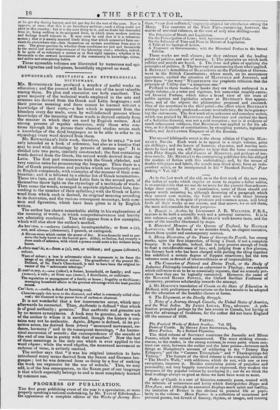ROWBOTHAM'S DERIVATIVE AND ETYMOLOGICAL DICTIONARY.
MR. ROWHOTHAM has produced a number of useful works on education ; and the present will be found one of the most Naluable among them. Its plan and execution are both excellent. The great majority of the technical words employed in the arts and sciences are derived from the Greek and Latin languages ; and their precise meaning and force cannot be learned without a knowledge of their roots,—a fact which is apparent from the blunders every day made, even by well-informed persons whose knowledge of the meaning of these words is derived entirely from the manner in which they are used by English writers. And among persons of regular education, only those who con- tinue through life to pursue their classical studies retain such a knowledge of the dead languages as to be able to refer to its etymology every word derived from them. Mr. ROWHOTHAM's little work, therefore, (as he says.) "is not only intended as a book of reference, but also as a treatise that may be read with advantage by persons of mature age." It is divided into two parts, similarly constructed; the first containing words derived from the Greek, the second words derived from the Latin. The first part commences with the Greek alphabet, and very concise rules for pronouncing the language. Then there is a list of Greek prepositions and particles which are frequently used in English compounds, with examples of the manner of their com- bination; and it is followed by a similar list of Greek terminations. These two lists, and the similar Latin lists in the second part, of themselves throw light on the etymology of a multitude of words. Then come the words, arranged in separate alphabetical lists, (ac- cording to the number of their syllables,) with the Greek or Latin word from which each is derived, its original meaning according to its derivation, and the various consequent meanings, both com- mon and figurative, which have been given to it by English writers.
The author has shown remarkable ability in his explanations of the meaning of words, in which comprehensiveness and brevity are admirably combined. This will appear from a few examples, which will also show the author's method.
As.bes'-tos, s.--avancri, (asbestos), inextingetishable ; or from a (a), not, and egsssvpi (sbennumi), I quench, or extinguish. A fibrous stone which resists the power of fire. It was formerly used to pre- serve the body burnt on the funeral pyre. Aldini, an Italian, had recently a dress made of asbestos, with which a person could eater a fire without being burnt.
-A-chro-magic, a.--from a (a), not, or without; and xe&aa (chrome), colour.
Want of colour; a lens is achromatic when it represents in its focus the image of an object without colour. The grandfather of the present Mr. Dollond, of St. Paul's Churchyard, is said to have been the original in- ventor of the " achromatic telescope."
E•conko-my, (vihos), a house, household, or family; and ity.eic (noises), a rule; or from was (nem), I distribute, or cultivate.
The regulation or management of a family or house ; frugality or thriftiness ; managing household affairs to the greatest advantage with the least possible menus.
Car =bon, s.--carbo, a dead or burning coal.
Chemists apply this term to the diamond, and what is commonly called char- coal; the diamond is the purest form of carbon or charcoal.
It is not wonderful that a few inaccuracies occur, which may afterwards be corrected. Thus, Authentic is defined " that which is of good authority ; genuine." But authentic and genuine are by no means synonymous. A book may be genuine, as the work of the author to whom it is ascribed, though the history it con- tains may not be authentic. Again, Rhyme is defined, in its pi i- mitive sense, (as derived from fluo,air) " measured movement, ca- dence, harmony ;" and in its consequent meanings, " An herme- tical succession of sounds; the correspondence of the sounds at the end of one line in poetry with that of another? Now the last of these meanings is the only one which is ever applied to the word rhyme; while the word rhythm, the measured movement or cadence of verse, is entirely omitted. The author says that " it was his original intention to have introduced many terms derived from the Saxon and German lan- guages; but be was deterred from so doing by a fear of making the work too expensive for the use of schools." This, we may add, is of the less consequence, as the Saxon part of our language is that which especially belongs to and is must completely learned by common use.































 Previous page
Previous page